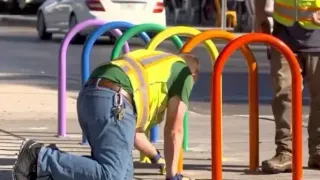December 9, 2015
Like He Means It: Philipp Karner Opens Up About His New Film
Frank J. Avella READ TIME: 14 MIN.
Like many struggling actors Philipp Karner found himself having to audition for work he no real interest in creatively. And as an out actor, he felt pressured to keep that information to himself. While living in L.A., with all its promises of fame and fortune, added to his growing disillusionment. A complex breakup was the catalyst he needed to turn to writing. Little did he know that a few years later he would be starring in and directing a semi-autobiographical screenplay he penned.
"Like You Mean It" is Karner's exceptional and atypical look at a once-loving gay relationship on the verge of ending and exploring whether it's salvageable. The film also delves into the inner world of its main character, Mark, an actor who is losing interest in his vocation, while going through a personal crisis.
Born in Vienna, Austria, to social worker parents, Karner boldly came out when he was a teen. He had thespian intentions early on and moved to New York right after he completed Austria's required yearlong military service.
Quite candid
His early credits include small roles on "Sex and the City," "The Sopranos" and "Will & Grace." He is best known for the Tory Spelling comedy, "Kiss the Bride," where he plays Matt, a gay man trying to reignite an old flame with his high school love, Ryan (James O'Shea), who is about to marry a woman (Spelling).
Karner co-wrote and starred in the feature, "Diving Normal," in 2013, with Sandra Bernhard.
EDGE spoke with a quite candid Karner about his life and his evolution as a writer/director/actor with "Like You Mean It" a movie that played the Festival circuit this past year (including Outfest), opened in L.A. last month and is being released by Breaking Glass Pictures on VOD and DVD on December 8.
"As a kid I was obsessed with films and everything that had to do with New York and Hollywood," Karner shares. "As a teenager, I started to make more specific plans about acting and moving to New York to study acting... I did little plays (in NY) and started doing small parts in television. Filmmaking didn't really enter my mind until I'd been living in Los Angeles for a few years and working as an actor on and off. I've always been really in love with film and I obsessively watch movies. And I'd always been writing little stories. And then I started writing this script about these two guys going through a breakup and I just decided to go for it and directed it myself. And now I really want to keep directing. I've found my passion, I think."
Autobiographical nature
That passion involved fashioning an LGBT-themed breakup movie that searches for clues to why seemingly solid bonds break. Karner isn't shy about the autobiographical nature of the film and his inspiration to write it. "Relationships have always really confounded me," Karner confesses, "I've had several relationships -- some that lasted a long time and had some amazing moments and some that were really challenging from the get go. So relationships have always been flabbergasting to me. Intimacy, really relating to someone honestly and having good communication is some of the most challenging stuff in life....
"I generally write about the things I can't stop thinking about. And I was with this guy for a few years and it was really great. It was the longest relationship I've been in so far. It was lovely for a long time and I reached this point with myself where I was really frustrated with all the things that I haven't accomplished in life and I started struggling with major self-esteem issues that had nothing to do with the relationship. And I took a lot of my frustration out on him and then I came to a place where I just wasn't sure where my issues came from, if it was just frustration with myself or there were issues within the relationship...
"I was in a really confused place and it was very difficult for him and for the relationship to handle and we worked very hard and long on trying to salvage it and eventually, when it became clear that it wasn't going to work, it was the only breakup I've had so far that was very different in that there was a lot of kindness and it never got to a nasty place. I gained a lot of respect for him and I really learned to love him again through the breakup. You can love someone and they still are not the right person for you. It was a very bittersweet ending and I really couldn't stop thinking about that relationship and the way we broke up and that was how the movie was born."
Triple-threat
The triple-threat artist cites the films of Mike Leigh, Steve McQueen's "Shame" and Andrew Haigh's "Weekend" among his influences, but the look of "Like You Mean It" was inspired by a specific filmmaker and film. "There's an Argentinian director, Lucrecia Martel, and she made a film called, 'The Headless Woman,' a few years back (2008) and it's one of my favorite movies. And visually I was blown away by it. It's about this woman who may or may not have run over a dog or child at the beginning of the film. She doesn't know and doesn't care to investigate. And throughout the course of the film it just gnaws at her and she starts to lose her mind. And there's a kid missing in town and she starts to realize she might have killed this kid. So it's a movie about someone's mind changing and her not really knowing how to deal with it. And I really loved the director's visual style."
The pic boasts fascinating flashback scenes, peppered throughout, that show Mark and Jonah (Denver Milord) in a more idyllic time, when they've first met.
"I always had this idea of this perfect image of a place that Mark's trying to get back to. I wanted a stark contrast to his reality in the present. And that took on a life of its own in the editing room... I think it speaks to this fantasy that we all have, gay or straight, that we want to have this perfect idyllic relationship. We want to be in love. We want to have butterflies forever and ever with someone. And there's so much pressure. It's one more thing we have to add to our list of things that we must accomplish in life. So people get scared when something gets real and the new shine of something wears off, which in every relationship I've been in, that does not last for a long time -- maybe a few months, a year -- but to try to get back to that is a mistake and I think that is what Jonah tries to do in the film. He's a really sweet person who loves Mark very much but I think that trying to get back to something you had in the beginning is futile."
A challenge
Wearing all three hats proved challenging for Karner. "There were some moments that were very challenging. You already have zero time as a director and there's never enough time when you're acting as well... I just couldn't catch my breath for the whole shoot but I had a really great crew so it ended up being a great experience. But my next film that I am writing I am not in!"
It took Karner a year to write the script and then another two to finance and film. "I raised half the budget and then shot the film, he says. "And then after the film was done I did an Indie-go-go campaign for post-production funds and I raised the remainder of the budget. That was probably the most stressful thing I've ever done. I didn't realize how much work a crowd funding campaign was going to be. It just took over my life."
One of the great joys to be found in the film is the performance of Milord as Jonah, who proved fairly easy to cast, "When it came time to cast Jonah, I really wanted to find someone who had a really masculine energy but could also show real vulnerability and openness...I had taken this acting class with Nancy Banks, a brilliant acting teacher, and I did a scene with Denver and he was really great and I had forgotten all about him. I sent Nancy an email...And she sent me a short list of a few actors and I met with all of them and Denver just blew it out of the park. He's an incredible actor and just a good sweet person. And that goes such a long way... Denver's brilliant. His audition is one of the special pieces on the DVD."
Auditioning horrors
Some of the more scathing aspects of the film have to do with the ridiculous world of auditions and what actors must put up with. In a hilarious scene, based in fact, Mark is recording the voice of a Nazi for a kid's game and is asked if he could play it more "mellow." "As an actor, there's a lot of stuff you end up doing because you think you have to," he shares. "You say yes to a lot of things you probably shouldn't say yes to. And I think that saying, 'life is just as much about the things you say no to,' is true. There are some things that I've done, some voiceovers or computer game auditions, that just didn't feel good...There was a lot of time spent on some things that didn't really bring me any joy or satisfaction. It's easy to say yes to everything and that's a slippery slope."
And Los Angeles is presented warts and all. "L.A. can be so many different things. Now that I've been here so long and I'm in a place where I feel like things are happening for me, things I've worked toward are paying off, There are so many beautiful things here but you have to seek them out...And there are just as many areas that are depressing and not beautiful whereas in New York you walk around and there are streetlights wherever you go and it's pretty exciting and nice to look at. I do love L.A. but when I was in a not so great place in my life, I felt like L.A. turned against me where I felt that everyone seemingly was way more successful than me and the city kind of rubs it in your face that you're not doing well...And I started hiding out. I felt very comfortable in my car. I wouldn't leave the house very much. I was holed up a little bit."
Coming to terms with his sexuality
In the film there's a powerful, enigmatic scene Mark has with his sister (the best scene in the film) and Karner dedicates the movie to his real life sister. "She's someone who, growing up, was really my life raft, he offers, "Especially coming out in my mid-teens in Austria, which was not that easy for me. And we never really got along as kids but as soon as I started the process of coming to terms with my sexuality she just became my rock, she couldn't have been more accepting and loving. So my sister is such a huge part of my life. And sibling relationship is a big part of the film."
Karner came to terms with his sexuality early on. "I came out in Vienna when I was 15-16, but I was still trying to be straight for a few more years -- I had a girlfriend -- and then it became clear by the time I was 17-18 that I was just fooling myself. I fell in love for the first time when I was 18, big time, with this guy in Paris right before I went to New York. And I spent the summer in Paris and then moved to New York City. That's when I really knew."
On being an "out" actor "it's a dangerous thing because there's so much shame that you have to overcome as a man. Maybe it's different now, so many kids growing up with so many different role models on television and film. There isn't this feeling of, 'oh, my God, I'm so different, what's wrong with me?' When I came out it was early '90s. There was no 'Will and Grace,' no 'Sex and the City.' There really weren't any gay characters on television so I felt very alone with it, which is why my sister became so important. But I think, as an actor, when you're auditioning for these roles, you think, 'I'll have to butch it up for this one.' It's this weird thing that I don't think straight actors ever have to consider. And I certainly had agents who didn't think (being out) was a good idea...A lot of the people who have, in the past, told me they didn't think it was a good idea to be openly gay were gay themselves. So I think there's a really interesting, weird homophobia within the gay industry part of the community."
Being authentic
He continues: "Now, I care less and less. I just think being authentic is the most important thing. Any kind of lie is such a burden. But I do think it's a very complex issue and, even in the last couple of years, I have run into people who have really big careers who are scared of coming out. And I look at them and think, 'well, what about Matt Bomer? What about all those people who have incredibly exciting careers and are handsome leading men-that's the big difference. It's one thing to be a character actor. Nobody's really looking at these people dreaming of sleeping with them...' But from what I've read about reaction to Matt Bomer, I'm amazed at how many women are like, 'fucking good for him! He's still sexy as hell.' I think it's great...It's a really dumb ignorant thing when you realize that someone's of a sexual orientation that doesn't mix with yours and (react) like 'oh god, now I'm not attracted to them anymore.' That's silly. They were never going to sleep with you, anyway."
Up next for Karner is a self-penned script he wants to shoot in his hometown of Vienna. "It's a family drama about a mother and daughter and the relationship that starts to develop with this neighboring family that moves into the building." He's also developing a gay love story set in Vegas.
So does this mean he's moving away from acting?
"I don't want to say I don't want to act anymore. I don't want to do anymore acting that I'm not excited about. I don't have the time for it. I want to spend time on my writing. But if something really great came along, acting-wise, I wouldn't say no to it."
Like You Mean It is now available on iTunes and Amazon: http://bit.do/LYMI_itunes and http://bit.do/LYMI_Amazon
Watch the film's trailer:






